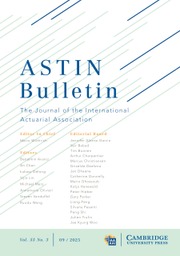Crossref Citations
This article has been cited by the following publications. This list is generated based on data provided by
Crossref.
Sundt, Bjørn
2002.
Recursive evaluation of aggregate claims distributions.
Insurance: Mathematics and Economics,
Vol. 30,
Issue. 3,
p.
297.
Lin, X. Sheldon
2004.
Encyclopedia of Actuarial Science.
Panjer, Harry H.
2004.
Encyclopedia of Actuarial Science.
Eisele, Karl-Theodor
2006.
Recursions for compound phase distributions.
Insurance: Mathematics and Economics,
Vol. 38,
Issue. 1,
p.
149.
Brigo, Damiano
Pallavicini, Andrea
and
Torresetti, Roberto
2007.
Calibration of CDO Tranches with the Dynamical Generalized-Poisson Loss Model.
SSRN Electronic Journal,
BRIGO, DAMIANO
PALLAVICINI, ANDREA
and
TORRESETTI, ROBERTO
2007.
CLUSTER-BASED EXTENSION OF THE GENERALIZED POISSON LOSS DYNAMICS AND CONSISTENCY WITH SINGLE NAMES.
International Journal of Theoretical and Applied Finance,
Vol. 10,
Issue. 04,
p.
607.
Brigo, Damiano
Pallavicini, Andrea
and
Torresetti, Roberto
2007.
Default Correlation, Cluster Dynamics and Single Names: The GPCL Dynamical Loss Model.
SSRN Electronic Journal,
Lin, X. Sheldon
and
Willmot, Gordon E.
2008.
Encyclopedia of Quantitative Risk Analysis and Assessment.
Embrechts, Paul
and
Frei, Marco
2009.
Panjer recursion versus FFT for compound distributions.
Mathematical Methods of Operations Research,
Vol. 69,
Issue. 3,
p.
497.
Gerhold, Stefan
Schmock, Uwe
and
Warnung, Richard
2010.
A generalization of Panjer’s recursion and numerically stable risk aggregation.
Finance and Stochastics,
Vol. 14,
Issue. 1,
p.
81.
Gathy, Maude
and
Lefèvre, Claude
2010.
On the Lagrangian Katz family of distributions as a claim frequency model.
Insurance: Mathematics and Economics,
Vol. 47,
Issue. 1,
p.
76.
Shevchenko, Pavel V.
2010.
Implementing loss distribution approach for operational risk.
Applied Stochastic Models in Business and Industry,
Vol. 26,
Issue. 3,
p.
277.
Shevchenko, Pavel V.
2011.
Modelling Operational Risk Using Bayesian Inference.
p.
71.
Jessen, Anders Hedegaard
Mikosch, Thomas
and
Samorodnitsky, Gennady
2011.
Prediction of outstanding payments in a Poisson cluster model.
Scandinavian Actuarial Journal,
Vol. 2011,
Issue. 3,
p.
214.
Eger, Steffen
2013.
A Contribution to the Theory of Word Length Distribution Based on a Stochastic Word Length Distribution Model.
Journal of Quantitative Linguistics,
Vol. 20,
Issue. 3,
p.
252.
Santos, Rui
Pestana, Dinis
and
Martins, João Paulo
2013.
Recent Developments in Modeling and Applications in Statistics.
p.
179.
2013.
Loss Models.
p.
339.
Lin, X. Sheldon
and
Willmot, Gordon E.
2014.
Wiley StatsRef: Statistics Reference Online.
Lin, X. Sheldon
2014.
Wiley StatsRef: Statistics Reference Online.
Felgueiras, Miguel
Martins, João Paulo
and
Santos, Rui
2014.
Computational Science and Its Applications – ICCSA 2014.
Vol. 8581,
Issue. ,
p.
539.


